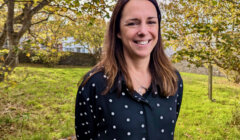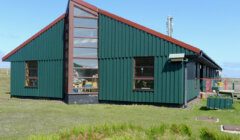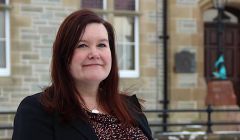Education / Remote teaching ‘enhancing choice’, committee told
DELIVERING lessons to schoolchildren through video link is about “enhancing choice” for pupils – particularly in remote areas of Shetland.
That was the message from acting quality improvement officer Robin Calder at Friday’s meeting of Shetland Islands Council’s education and families committee.
There are currently four remote teaching pilots being undertaken in Shetland, with one seeing German being taught to primary pupils in Fair Isle, Foula and Fetlar by a teacher from the Anderson High School.
Spanish is also taught to primary six and seven children in Whalsay School from a teacher living outside of Shetland, while history is delivered to S3 pupils at Sandwick from the Western Isles.
Accordion lessons, meanwhile, are given to pupils in Brae High School, Mid Yell Junior High School and Whalsay School from an instructor working from the Anderson High School.
Calder gave an update to councillors on Friday on how the trials are progressing – with a clear message given that the scheme is not a way of replacing one-to-one teaching in person.
“There’s no agenda to replace teachers with remote teaching,” he said.
“This is about enhancing opportunities for pupils, particularly in the more remote settings.”
Calder did say, however, that it can also offer a solution for areas with recruitment struggles.
He said the next stage of the process is to “move away from simply being pilots” and put a formal approach in place.
Some questions remain in areas like how children are supervised during lessons, Calder said.
“There have been difficulties with broadband and connectivity in terms of delivering to the remote islands,” he added.
Providing lessons over video, meanwhile, had been met with raised eyebrows by some parents – but it seems they have been won over.
“Parents for instance with the accordion lessons were quite skeptical about this,” Calder said.
Become a member of Shetland News
“But when it came to the review, the parents themselves were delighted with the experience their children have had.”
Lerwick councillor Peter Campbell said he was “delighted to see things progressing in this direction”.
He questioned whether Spanish, for instance, would be rolled out to secondary pupils in Whalsay, with the councillor told that there were hopes it could be delivered for older children once it is tested out with the younger ones first.
North Isles member Ryan Thomson said it was an “excellent” initiative, but he questioned why history was being taught to children in Sandwick by someone from the Western Isles.
Calder said the Western Isles council had been keen to work with Shetland, adding that the delivery of history to Sandwick came in an attempt to plug a gap in provision.
Director of children’s services Helen Budge said history had previously been taught at Sandwick by someone who was dual qualified before they left.
“This is an opportunity to use this to enhance the curriculum,” she said.
Budge admitted Shetland had a shortage of teachers at the moment, although the isles are not unique in that respect.
“It’s a solution to a national issue,” she said of remote learning.
Martin Tregonning, meanwhile, said the scheme could be of benefit particularly during periods of recruitment difficulties, but he added there was a “danger” of remote teaching being established in a way that it “becomes the default”.
He also said “people out there are naturally cynical or suspicious”, meaning some members of the public may view the scheme as a way to cut corners.
Chairman George Smith said the next stage would be to “convince the Scottish Government that this is necessary if we are going to sustain rural eduction”.
“If the evidence is there then we have a head start,” the south end councillor said.
Become a member of Shetland News
Shetland News is asking its readers to consider paying for membership to get additional perks:
- Removal of third-party ads;
- Bookmark posts to read later;
- Exclusive curated weekly newsletter;
- Hide membership messages;
- Comments open for discussion.
If you appreciate what we do and feel strongly about impartial local journalism, then please become a member of Shetland News by either making a single payment, or setting up a monthly, quarterly or yearly subscription.




























